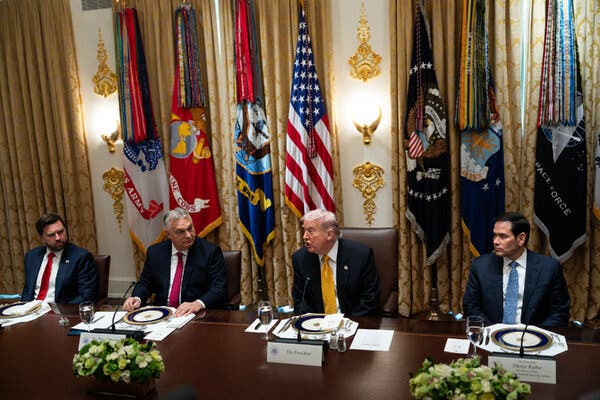Trump Grants Hungary One-Year Sanction Exemption on Oil Imports

President Donald Trump has granted Hungary a one-year exemption from U.S. sanctions on countries purchasing Russian oil. This decision followed a meeting with Hungarian Prime Minister Viktor Orban at the White House on March 15, 2024. The exemption is part of a broader set of agreements aimed at addressing Hungary’s energy needs amid ongoing tensions stemming from the war in Ukraine.
The sanctions, enacted to pressure Russia to cease its military actions in Ukraine, mark a significant move by the United States. According to a White House official who requested anonymity, the exemption represents a diplomatic win for Orban, who is facing a challenging re-election campaign. Shortly after the meeting, Orban announced the deal through social media, highlighting the importance of the agreement for Hungary’s energy security.
As part of the deal, Hungary committed to purchasing liquefied natural gas from the United States, with contracts valued at approximately $600 million. In his post, Orban stated that Trump had “guaranteed full sanction exemptions” for two major pipelines, TurkStream and Friendship, which are crucial for maintaining low energy prices in Hungary.
Orban emphasized the economic risks posed by the U.S. sanctions, which he argued could jeopardize Hungary’s already struggling economy. With 86 percent of its oil imports originating from Russia, Hungary is particularly vulnerable compared to its European neighbors. During the meeting, Orban reiterated that Hungary’s geographical limitations, being landlocked, restrict its energy options.
Trump expressed understanding of Hungary’s situation, noting the country’s lack of access to ports, which complicates energy procurement. Despite his willingness to grant the exemption to Hungary, Trump criticized other European nations for continuing to purchase Russian oil, stating he was “disturbed” by their actions.
The exemption is a notable concession by Trump, as the sanctions represent some of the most significant measures the U.S. has implemented against Russia’s energy sector since the onset of the conflict. For months, Trump has urged European countries to halt oil purchases, which serve as a substantial funding source for Russia’s military operations.
Research from the Atlantic Council indicates that Hungary’s dependency on Russian oil has increased since the full-scale invasion of Ukraine in 2022. Orban has maintained a sympathetic stance toward Russian President Vladimir Putin, diverging from the broader European consensus by suggesting that Ukraine should cede territory to achieve a ceasefire.
This diplomatic engagement between the United States and Hungary reflects the complexities of international relations in the current geopolitical landscape. As the situation evolves, the implications of this exemption will likely resonate throughout Europe and beyond.






